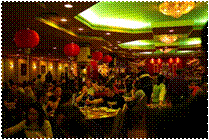JUNE 2008
In this issue:
1. Readers’ Comments
2. Newsbits
3. June Editorial: “Shoppers’ Mind”
4. Preview: Next Month’s Editorial
5. Quote of the Month – Randy Pausch
6. Hot Link of the Month
7. Want to Blog?
8. Click and Play of the Month
1.READERS’ COMMENTS
Judy Phillip, PricewaterhouseCoopers, Trinidad-Tabago, re: “The Preoccupied American” (last month’s editorial)
What you have written about is what most of us think about in our heads, but could never face it in reality. Your short story applies not only to the Preoccupied American, but also the Preoccupied Trinidadian, after all when our minds are consumed with having to spend four hours on a daily basis in traffic, there isn’t much room for anything else.
2.NEWSBITS
Next Month is Tenth Anniversary of Newsletter
It’s hard for me to believe but next month will be the tenth anniversary of this monthly newsletter. The title has changed twice and it has evolved some – hopefully better – but July will be the 120th issue. Seems like something special should happen but no ideas occur to me….probably because it is only a big deal for me not for you the reader/subscriber. If anyone has an idea, let me know.
A Very Rational and Practical View of Global Climate Change
I have forwarded this video to many friends who won’t even engage in a discussion about global warming. The man featured in the video is a high school and college science teacher, Greg Craven from Corvallis, Oregon. You may find it useful to at least start a conversation with those who won’t even talk about it. Here’s the link.
Barnes & Noble Features John’s Video on Book
Berrett-Koehler Publishers – publisher of several of my books, including my first anthology New Traditions in Business – recently recorded a video of me talking about that book and it now appears on the Barnes & Noble website.
3. JUNE EDITORIAL
When Willis Harman wrote Global Mind Change in the 1980s, he was talking about shifting the way we thought about each other and the world. That was in the day when talk of paradigm shifts and new paradigms was gaining traction and some of us even wrote about the characteristics we envisioned for each (see my entry in the field from 1989).
There’s been little success in conveying new paradigm thought to the masses in the past twenty years, perhaps because even the word “paradigm” rings of academe and intellectual snobbery. Could there be a better word that could catch on like Gladwell’s “tipping point”?
Those of us who have been contributing to the literature of social and organizational transformation all these years have been addressing a complex situation, which includes the many facets of a worldview and all the underlying assumptions that go with them, while for the most part people want simple, easy to comprehend ways of understanding it. This gap between what needs to be understood and what people are willing to listen to and understand is very frustrating for those of us who write and speak of this transformational mindset. I’m sure it is also frustrating for those attempting to grasp it.
Many of the unwanted behaviors so apparent in the world are symptoms of a larger problem, a “dis-ease” about the reality in which we live. Some are trying to convince others to believe the way they do; others are seeking to dominate, control or gain power; some are acting out of greed; and others are acting out addictions of various sorts. But all of these actions are attempts to compensate for whatever is perceived as “out of whack” in the world. People who enjoy serenity, sufficiency, relatedness and belongingness rarely start wars, murder or rape anyone, take advantage of others for personal gain, steal or vandalize the property of others.
Photos courtesy of Bill Liao
One, just one, of the behaviors originating from some greater underlying unfulfilled need is consumerism. While it is most intense here in the United States, it is spreading as a part of globalization and what has now become known as “development.” I have written in the past about the obsessive aspect of consumption and that many are actually addicted to shopping, but there a more benign element occurred to me the other day. Like the compulsive shopper, this element also was born after World War II, when buying on credit started becoming popular. This element is what I’m calling “shopper’s mind.”
Shopper’s Mind is the state where one is constantly vigilant for bargains, something unusual, and/or something one thinks they need. Most of us in the West (industrialized countries and regions) have developed this “always on” radar looking for a gadget, an idea, information, a connection with another person, an opinion, something that will make us “better” (more important, popular, smarter, attractive or wiser), at least in our own view.
Shopper’s Mind doesn’t just fire up when one is in the mall or a super store. It is always on! We check each other out with Shopper’s Mind. We do our work in this mode. We listen to the car radio this way. Shopper’s Mind is always looking to improve one’s identity and is looking for it out there someplace. As long as we are seeking identity from something outside ourselves, we are looking in the wrong places. The Italian psychologist Piero Ferrucci writes “there exists in us a whole identity, endowed with qualities and abilities of the highest order, which we do not recognize we have. We therefore live a life far below our psychological and spiritual means.”
Shopper’s Mind is a spiritual crisis – a distraction from simply being with oneself – quite possibly because one doesn’t know who they are without the external adornments. This feeling of inadequacy is what can drive people to acquire more knowledge, more stuff, more sex, more of whatever it is that fills that emptiness, at least for a short time.
Nobel Laureate Amartya Sen tells us when we identify with things outside of us – some cause, belief, group of people, ideology or movement – we become capable of different behavior. We could have several or even many identities, or just one; however, the latter could lead to some dark behaviors. He writes, “…identity can also kill – and kill with abandon.” This can lead to dehumanizing “the other” and ruthless behavior such as genocide in one extreme to simple exploitation at a more benign extreme. This obsession with things external lies at the heart of the dis-ease – this great disconnect.
This disconnect is a cut-off from Spirit, God, ineffable source of inspiration, strength and love – and it can be healed. Eckhart Tolle writes, “What is arising now is not a new belief system, a new religion, spiritual ideology, or mythology. We are coming to the end not only of mythologies but also of ideologies and belief systems. The change goes deeper than the content of your mind, deeper than your thoughts. In fact, at the heart of the new consciousness lies the transcendence of thought, the newfound ability of rising above thought, of realizing a dimension within yourself that is infinitely more vast than thought. You then no longer derive your identity, your sense of who you are, from the incessant stream of thinking that is the old consciousness you take to be yourself. What a liberation to realize that the “voice in my head” is not who I am. Who am I then? The one who sees that. The awareness that is prior to thought, the space in which the thought – or the emotion or sense of perception – happens.” This is transcendence!”
My own experience is the more comfortable I am in being me, with my sense of identity, the less need I have for anything to bolster my self esteem or make me feel better about myself. Nevertheless, I live in the world of Shopper’s Mind and am bombarded with it from all sides constantly. To remain unaffected I must maintain a state of consciousness distinct from the collective.
____
NOTE: The CEO of Public Radio International has some interesting facts to share about how this consciousness selects news at the March 2008 TED Talks
_______________________________________________________
4. NEXT MONTH’S EDITORIAL:
“Thinking Responsibly: Knowing the Difference Between Who We Are and Who We Think We Are”
5. QUOTE OF THE MONTH:
“Experience is what you get when you don’t get what you want.” – Randy Pausch (watch his video)
6. HOT LINK OF THE MONTH:
The Declaration of Global Citizenship is a public resolution where citizens declare their commitment and act in such a way as to transform “transform global issues and thereby themselves for the collective good.” John contributed to the initial draft and has signed it.
7. WANT TO BLOG?
My blog – “Exploring the Better Future” – is located at the Global Dialogues Center; take a look and post your comments. I’d love to hear from some of you subscribers!
8. “CLICK & PLAY” OF THE MONTH: (see Audio and Videos)
Global Dialogue Center’s Debbe Kennedy interviews John (22 minutes)

